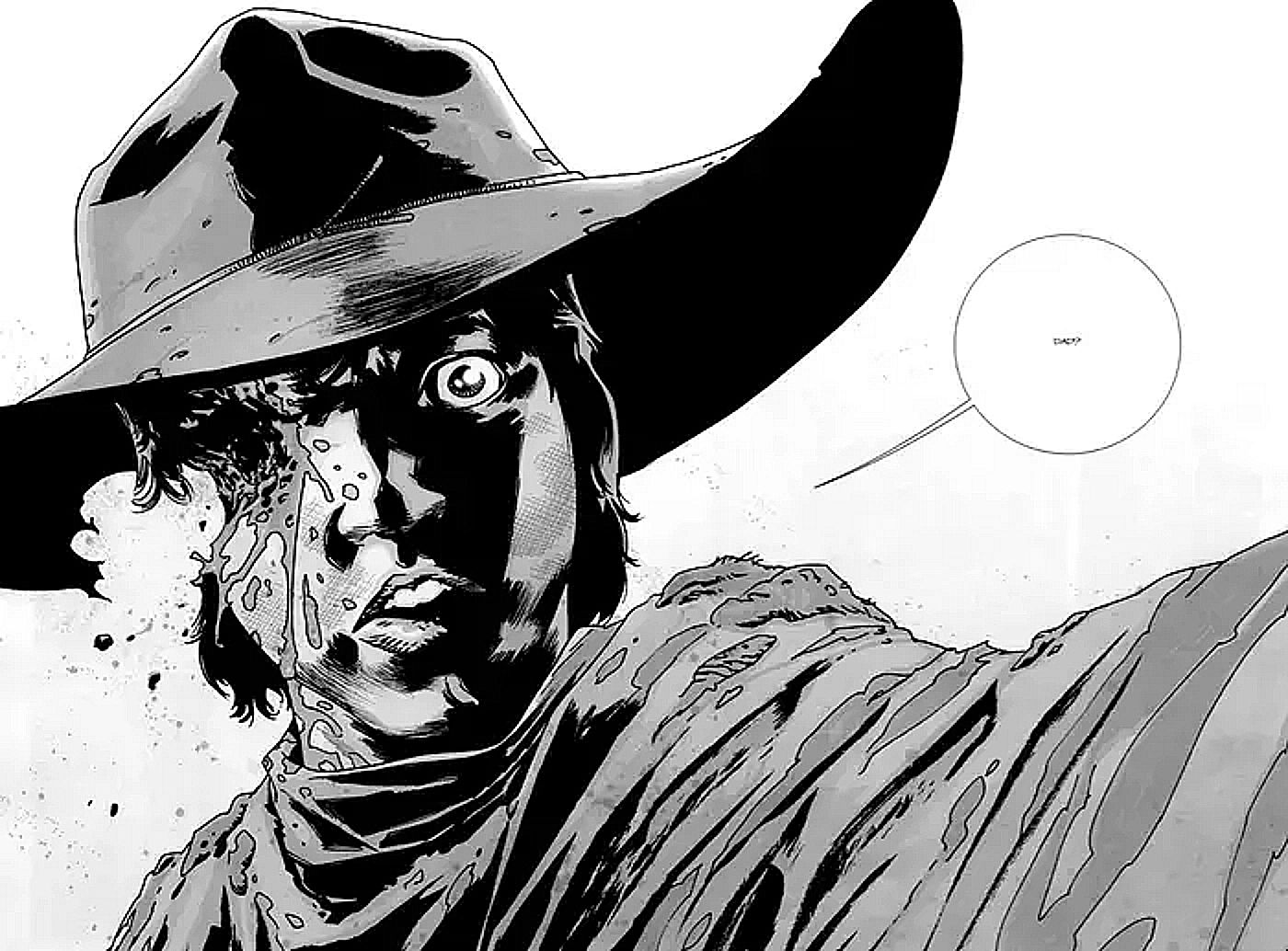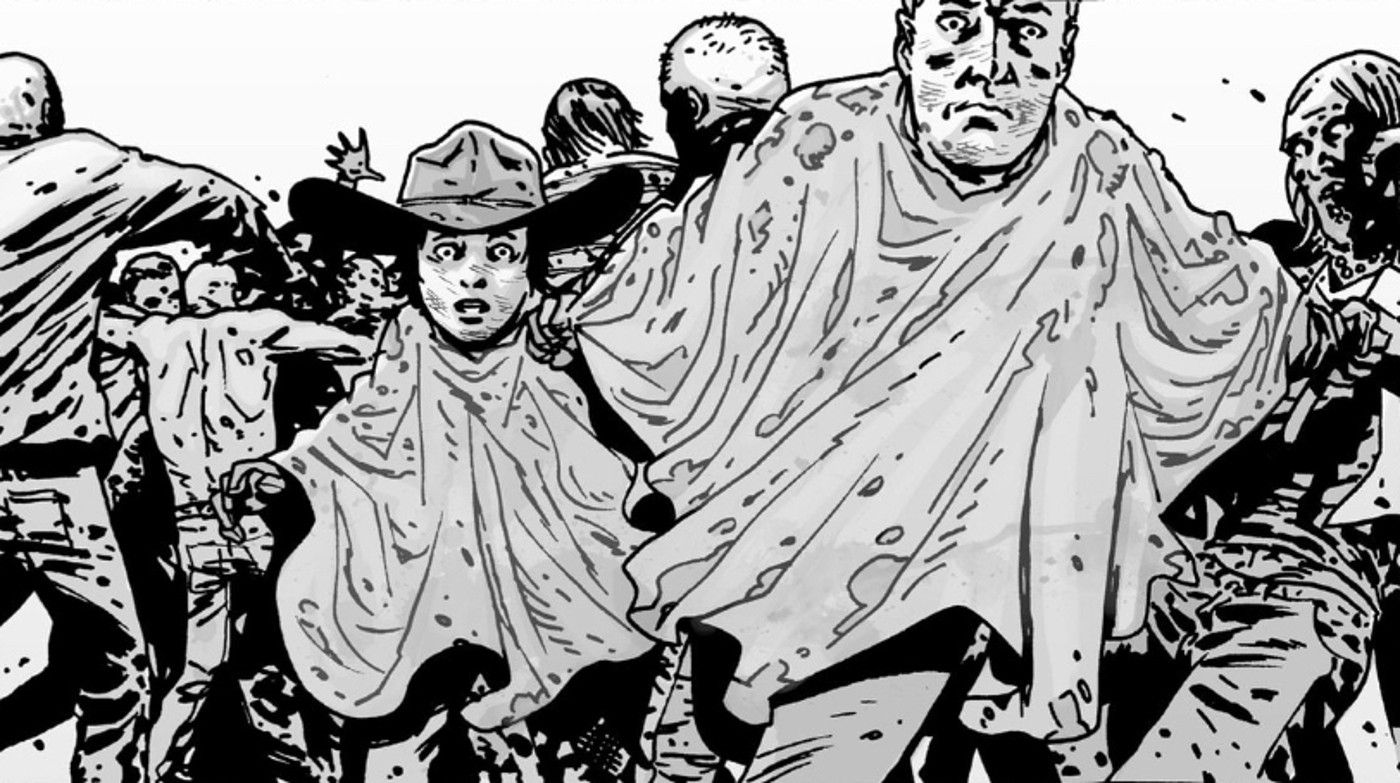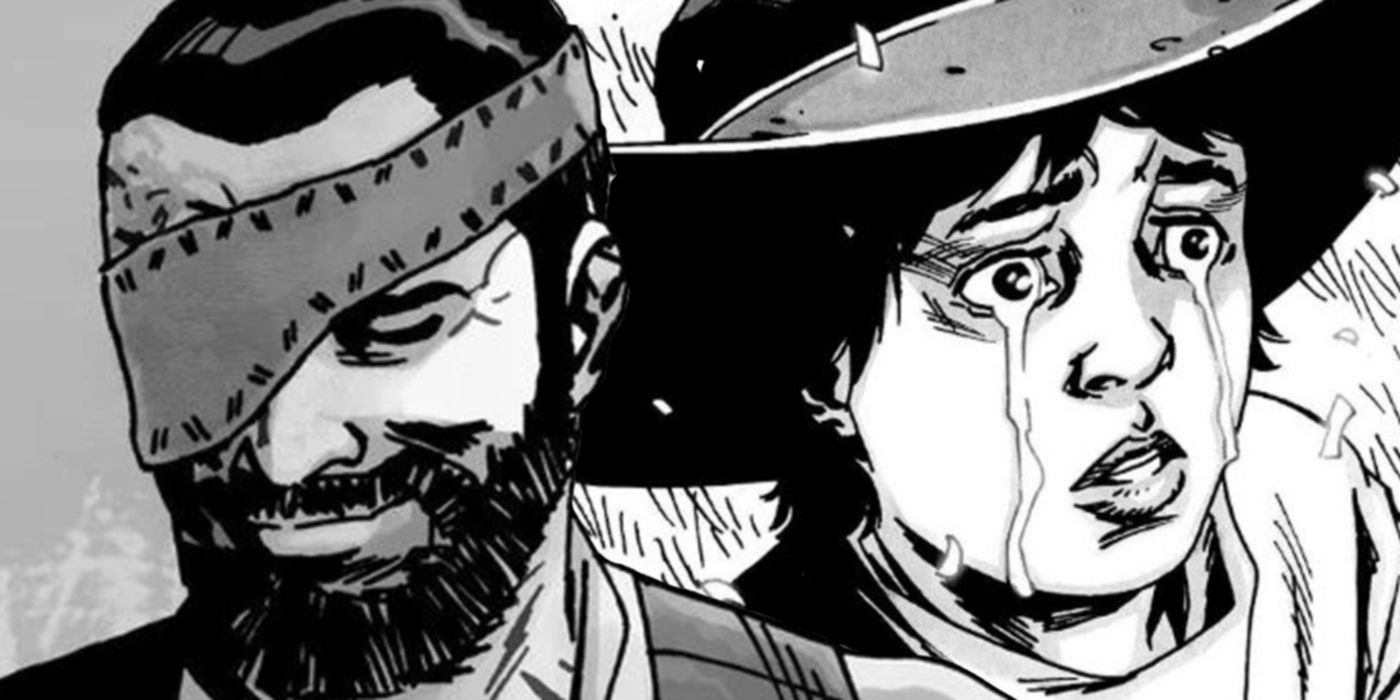
Robert Kirkman, creator of The Walking Dead, once teased that the TV version of Carl’s days were numbered – and though it took seven years, he was proven right in the end, as the AMC adaptation of the zombie horror series killed off its iteration of the character in Season Eight. In time, as it turned out, the true surprise was not that TV-Carl died, but that comic-Carl lived.
The Walking Dead Deluxe #89 – back in publication as part of the ongoing full-color reissue of the series – includes a reprint of the original letters section from the comic, first published in 2011.
Following Carl’s graphic loss of an eye in The Walking Dead #83, Kirkman received voluminous fan mail begging for the salvation of the character. In issue #89, in response to a letter asking “PLEASE DON’T KILL CARL,” the author made an ominous, and ultimately correct, prediction about TV-Carl.
Robert Kirkman Predicted AMC’s Adaptation Would Kill Off Carl Years Early
The Walking Dead Deluxe #89 – Written By Robert Kirkman; Art By Charlie Adlard; Color By Dave McCraig; Lettering By Rus Wooten


Though his comment in The Walking Dead #89’s letters section was made in jest, it does display [Robert] Kirkman’s recognition that his story and the TV show’s would inevitably diverge.
For Walking Dead readers at the time, Carl’s gruesome injury in The Walking Dead #83 put the character in a precarious position. Given the verisimilitude of the story up to that point, his survival seemed highly unprecedented, if not nigh-impossible. In his annotations to the issue in The Walking Dead Deluxe #83, Robert Kirkman admitted that – as was depicted in the issue – Carl’s wound should have been “impossible to survive.” And yet, Carl lived, though the issues to follow drove fans into a frenzy of anticipation, as they braced themselves for his seemingly inevitable end.
In The Walking Dead #89, with Carl’s life still hanging in the balance, the writer responded to a fan’s plea, “Mr. Kirkman, please don’t break my heart,” with a message that was the exact opposite of reassuring. He wrote:
Does it bring you any comfort that if he dies, there’s still TV Carl to live in his stead?
For now! (Just kidding, Chandler.)
With this reply, Kirkman did more than just double down on the linger “if” of Carl’s survival –he raised the possibility that the television series could, at some point, kill off their version of the character. As fans of the franchise know, he was proven right several years later.
By the time the comic series wrapped up with an unexpected epilogue in 2019’s The Walking Dead #193, the TV-Carl had already been dead for over a year. The comic book version, meanwhile, miraculously lived to adulthood, finding a measure of stability – starting a family, and helping society to rebuild – in what was a poignant, if unexpectedly gentle coda to the notoriously violent story. Though his comment in The Walking Dead #89’s letters section was made in jest, it does display Kirkman’s recognition that his story and the TV show’s would inevitably diverge.
Writing Out Carl Was A Necessary Move For The TV Series
The Story Outgrew The Character


Killing off TV-Carl was as essential to the show’s progression as keeping comic-Carl alive was for The Walking Dead on the page.
As is the case with any adaptation, alterations to the TV incarnation of The Walking Dead from its comic book source material began early, and occurred often, compounding with each change as the series went on. One major plot point the series adapted was Carl’s eye injury. By the time the show reached that point in the comic, Carl had become even more beloved by the fandom, and the loss of his eye functioned as a core part of his identity. For AMC’s Walking Dead showrunners, it was an unavoidable character beat, which they brought to the screen strikingly.
After that, however, as the trajectory of the show’s story grew even further removed from the comics, and it seemed as though Carl didn’t have an integral place in the story, the way his comic book counterpart did. In due course, that led to the character’s shocking exit from the series. TV-Carl died as so many Walking Dead characters before him did, as a result of a zombie bite, which led him to take his own life before turning. In many ways, the emotional impact of this was vital to keeping the series going.
By its nature, adaptation of a story between mediums requires change. As a result, crafting a successful adaptation involves the ability to recognize when a change has to be made, just as much as it is about knowing when and how to re-create certain important story, pivotal character moments, and memorable scenes. Though many fans were not pleased with TV-Carl’s death when it happened, in retrospect, it displayed this sense on the creative team’s part. Killing off TV-Carl was as essential to the show’s progression as keeping comic-Carl alive was for The Walking Dead on the page.
AMC’s Walking Dead Was Never Going To Share The Comic’s Ending
It Might Never End

One of the great benefits of the Deluxe reissue has been the chance to go back and revisit Robert Kirkman’s interactions with the comic’s fans, in the context of the complete story.
By The Walking Dead #89, Robert Kirkman was already laying groundwork for the story’s eventual ending, and it is possible he had already accepted that the TV show would not reach the same conclusion. Evoking TV-Carl – and actor Chandler Riggs – in his response about comic-Carl’s fate seemingly hinted that this was on his mind, even if TV-Carl’s actual demise didn’t come until the latter stages of the television series’ run. While nobody knew, in 2011, how either the comic or the TV show would end, Kirkman may have been reasonably certain Carl wouldn’t play the same role in both.
Of course, that is just speculation, based on his answer in the letters page of The Walking Dead #89. However, it has become clear that one of the great benefits of the Deluxe reissue has been the chance to go back and revisit Robert Kirkman’s interactions with the comic’s fans, in the context of the complete story. Halfway through the comic’s run, and early in the adaptation’s, it was already evident their endings might not be the same – though it was not yet clear that this was because the megasuccess of the franchise would keep it in production for years to come.
As a whole, the franchise has grown dramatically in the decade-plus since. While the comic and the flagship Walking Dead show both ended, the wider world of the adaptation continues to thrive across multiple spin-offs, and fan appetite for the comic’s rerelease is nearly as ravenous as during the original run. Robert Kirkman’s prediction of TV-Carl’s eventual death is just one of many fascinating insights that the letters pages to The Walking Dead comic still hold, even so many years later.




